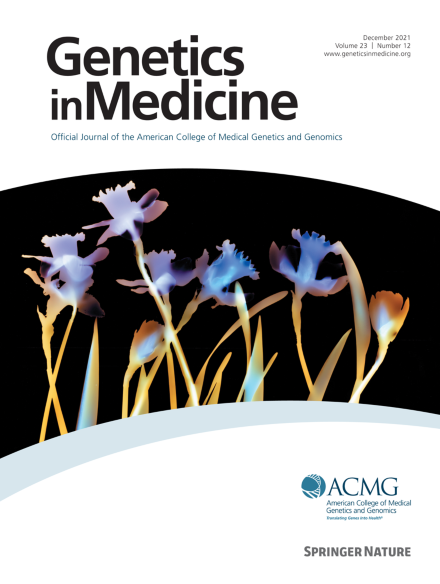Mitochondrial 3-hydroxy-3-methylglutaryl-coenzyme A synthase deficiency: From metabolism to clinical implications
IF 6.2
1区 医学
Q1 GENETICS & HEREDITY
引用次数: 0
Abstract
Purpose
Ketone bodies represent an important energy source and can contribute much to the energy supply of the brain. Mitochondrial 3-hydroxy-3-methylglutaryl-coenzyme A synthase deficiency (HMGCS2D) is an autosomal recessive disorder of ketogenesis caused by biallelic variants in HMGCS2. Only 59 patients with this disorder have been reported so far.
Methods
We performed a comprehensive literature search to identify all published cases of HMGCS2D (n = 59). Additionally, the data of 16 patients with this disorder who are yet undescribed were collected. Clinical course, biochemical findings, and mutation data are highlighted and discussed. An overview on all HMGCS2 variants reported in patients is provided.
Results
Sixty-eight patients (91%) presented with an acute metabolic decompensation, mostly within the first year of life but beyond the neonatal period. Asymptomatic individuals were identified in several families. Six patients (8%) had died, mainly during the initial metabolic crisis. The neurologic long-term outcome of surviving patients was favorable with almost all patients (98%) showing normal development. Only 1 variant was identified to be common, (HMGCS2) NM_005518.4:c.634G>A p.(Gly212Arg), and found in 6 families. No genotype-phenotype correlation can be established.
Conclusion
This comprehensive data analysis provides an overview on all published patients reported with HMGCS2D, including a list of HMGCS2 variants identified in affected individuals.
线粒体3-羟基-3-甲基戊二酰辅酶A合成酶缺乏:从代谢到临床意义。
目的:酮体是一种重要的能量来源,对大脑的能量供应有很大贡献。线粒体3-羟基-3-甲基戊二酰辅酶A合成酶缺乏症(HMGCS2D)是由HMGCS2双等位基因变异引起的常染色体隐性生酮疾病。到目前为止,只有59例患者被报道患有这种疾病。患者和方法:我们进行了全面的文献检索,以确定所有发表的HMGCS2D病例(n=59)。此外,收集了16例尚未描述的这种疾病患者的数据。强调并讨论了临床过程、生化结果和突变数据。提供了在患者中报告的所有HMGCS2变体的概述。结果:68例(91%)患者出现急性代谢失代偿,大多数发生在出生后的第一年,但超过新生儿期。在几个家庭中发现了无症状个体。6例(8%)患者死亡,主要发生在最初的代谢危象期间。存活患者的神经系统长期预后良好,几乎所有患者(98%)发育正常。在6个家族中只发现了一个常见的变异(HMGCS2) NM_005518.4: c.634G>A, p.(Gly212Arg)。基因型与表型之间不存在相关性。讨论:这一全面的数据分析概述了所有报道的HMGCS2D患者,包括受影响个体中确定的HMGCS2变异列表。
本文章由计算机程序翻译,如有差异,请以英文原文为准。
求助全文
约1分钟内获得全文
求助全文
来源期刊

Genetics in Medicine
医学-遗传学
CiteScore
15.20
自引率
6.80%
发文量
857
审稿时长
1.3 weeks
期刊介绍:
Genetics in Medicine (GIM) is the official journal of the American College of Medical Genetics and Genomics. The journal''s mission is to enhance the knowledge, understanding, and practice of medical genetics and genomics through publications in clinical and laboratory genetics and genomics, including ethical, legal, and social issues as well as public health.
GIM encourages research that combats racism, includes diverse populations and is written by authors from diverse and underrepresented backgrounds.
 求助内容:
求助内容: 应助结果提醒方式:
应助结果提醒方式:


